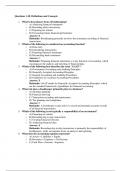Exam (elaborations)
Bookkeeping Versus Accounting
- Course
- Institution
1. What is the primary focus of bookkeeping? o A) Analyzing financial statements o B) Recording daily transactions o C) Preparing tax returns o D) Forecasting future financial performance Answer: B Rationale: Bookkeeping primarily involves the systematic recording of financial transactions. ...
[Show more]



